Caryn’s Thoughts
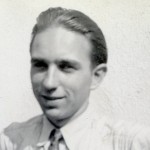
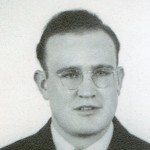 In August of 1964, my dad, Allen Spencer bought a Hollywood Reloading Press from his brother, William Spencer. Uncle Bill is two years older than my dad, and he loved his little brother, was always protective of him, and took him under his wing. As a little boy, Dad was really proud of his big brother, and wanted to say “brother” very badly, but he couldn’t quite get the word out correctly. Instead it always came out “Bowa” when Dad said it. After a while “Bowa” stuck, and the brothers both used it often. When Uncle Bill sent Dad the Reloading Press, he sent with it, a letter carefully explaining its safety instructions and its warnings. While going through Dad’s things, we came across that letter. It was such a treasure to find it, because it so perfectly depicted the relationship the brothers had.
In August of 1964, my dad, Allen Spencer bought a Hollywood Reloading Press from his brother, William Spencer. Uncle Bill is two years older than my dad, and he loved his little brother, was always protective of him, and took him under his wing. As a little boy, Dad was really proud of his big brother, and wanted to say “brother” very badly, but he couldn’t quite get the word out correctly. Instead it always came out “Bowa” when Dad said it. After a while “Bowa” stuck, and the brothers both used it often. When Uncle Bill sent Dad the Reloading Press, he sent with it, a letter carefully explaining its safety instructions and its warnings. While going through Dad’s things, we came across that letter. It was such a treasure to find it, because it so perfectly depicted the relationship the brothers had.
Always the big bowa, Uncle Bill was very excited that my dad wanted a reloading press, and since Uncle Bill was a gun dealer, who else would Dad have gone to when he wanted to make such a purchase. For those who don’t know, a Hollywood Reloading Press turns used ammunition into loaded ammunition again. Uncle Bill loved guns and all the accessories, and so it stood to reason that Dad would follow suit. The brothers had always used guns for hunting and safety, and even dynamite for blowing out tree stumps…and the occasional gate post. While boys would be boys, these boys weren’t troublemakers, but were rather careful and respected these items. They knew that improper use could be deadly. While my dad had grown up knowing about guns, Uncle Bill knew that he had not used a reloading press before, and he wanted to make sure nothing went wrong. It wasn’t that Uncle Bill thought my dad was careless, he just wanted him safe, and the reloader could bring danger, if not used correctly.
The letter, in my mind, was more about the love Uncle Bill had for my dad, than it was about the Hollywood 
 Reloading Press. Theirs was a close relationship that each of them treasured. Uncle Bill always loved writing letters. He always felt that the written documentation was forever. It carried with it the history of events that occurred in the life of the writer and the receiver. So few of us understand that, I think…at least not until it’s too late. The letter about the Hollywood Reloading Press will always be a treasure to all of my family. I’m sure that the letter was a treasure to my dad too, since he kept it all those years. And I will always think of “Bowa” when I think of the brothers now.
Reloading Press. Theirs was a close relationship that each of them treasured. Uncle Bill always loved writing letters. He always felt that the written documentation was forever. It carried with it the history of events that occurred in the life of the writer and the receiver. So few of us understand that, I think…at least not until it’s too late. The letter about the Hollywood Reloading Press will always be a treasure to all of my family. I’m sure that the letter was a treasure to my dad too, since he kept it all those years. And I will always think of “Bowa” when I think of the brothers now.
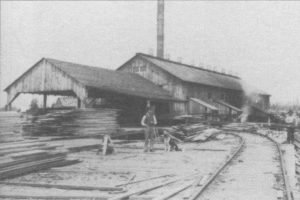
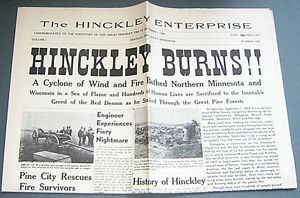 Every wildfire takes with it many victims. Humans, of course, are the most tragic, but they also take animals, homes, and plant life. When a fire gets out of control, devastation will soon follow. Often, all we think about is the loss, and that is a terrible thing, but sometimes something happens that brings a degree of victory and elation to an otherwise horrible situation. Such was the case in the September 1, 1894 Hinckley, Minnesota fire. The loss of life was devastating, with some accounts saying 440 and others saying 418…partly because the Indians weren’t counted in that amount, and partly because there were people who were never found.
Every wildfire takes with it many victims. Humans, of course, are the most tragic, but they also take animals, homes, and plant life. When a fire gets out of control, devastation will soon follow. Often, all we think about is the loss, and that is a terrible thing, but sometimes something happens that brings a degree of victory and elation to an otherwise horrible situation. Such was the case in the September 1, 1894 Hinckley, Minnesota fire. The loss of life was devastating, with some accounts saying 440 and others saying 418…partly because the Indians weren’t counted in that amount, and partly because there were people who were never found.
The upper Midwest of the United States was a wooded area, rich in timber. Hinckley was a lumber and rail town, that had been built along the Grindstone River in Minnesota near the Wisconsin border. The main industry was the lumber business, and the slash cutting technique left behind it large amounts of wood debris. The town was nicknamed The Town Built Of Wood. Little did they know what a tragic nickname that would turn out to be. The lumber yards were built quite close to the railroad tracks, and the sparks from the 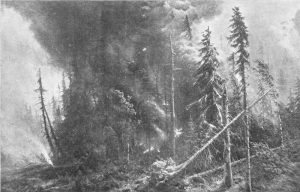 trains often set the wood debris on fire. Those fires were problematic, but no one expected the part the trains would play in 1894. That summer, a drought hit the Upper Midwest, making fires much more dangerous. The whole situation exploded on September 1, 1894, when fires near two rail lines south of Hinckley broke out, spreading north. When the raging fire reached the train depot, 350 of the residents got on a train to escape. The train passed right through flames, but reached safety in West Superior, Wisconsin. Were it not for this train, the loss of life would have been much higher. A number of the town’s residents took refuge in the swamps near town, but many of these people were killed, sadly some of them died by drowning. About 100 other residents fled to a gravel pit filled with water, and most of those people managed to survive. A train that was entering Hinckley from the north reversed direction to avoid the blaze. It still caught fire, and the only survivors were those who were able to jump from the train into a lake.
trains often set the wood debris on fire. Those fires were problematic, but no one expected the part the trains would play in 1894. That summer, a drought hit the Upper Midwest, making fires much more dangerous. The whole situation exploded on September 1, 1894, when fires near two rail lines south of Hinckley broke out, spreading north. When the raging fire reached the train depot, 350 of the residents got on a train to escape. The train passed right through flames, but reached safety in West Superior, Wisconsin. Were it not for this train, the loss of life would have been much higher. A number of the town’s residents took refuge in the swamps near town, but many of these people were killed, sadly some of them died by drowning. About 100 other residents fled to a gravel pit filled with water, and most of those people managed to survive. A train that was entering Hinckley from the north reversed direction to avoid the blaze. It still caught fire, and the only survivors were those who were able to jump from the train into a lake.
The fire burned 300,000 acres of town and forest, causing about $25 million in damages. In Hinckley, 228 people died, and another 200 in the surrounding areas, including 23 Ojibwa natives. It was a firestorm, with “as much force as an atomic bomb,” to quote a display at the town museum. Hinckley’s afternoon inferno also burned burned up five surrounding villages as it consumed over 400 square miles of kindling. It became known as the Great Hinckley Fire. A small group of statues in town represents survivors in the gravel pit. The Fire Monument and mass grave is on Fire Monument Road, very near the current interstate. Mass graves of 248 people are 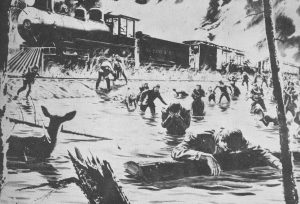
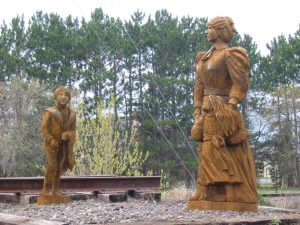 in lumpy mounds just behind the marker, dedicated in 1900 to the pioneers of civilization in Minnesota. Boston Corbett, killer of Abe Lincoln’s killer, is said to have left his “hole-in-the-ground home” in Kansas and died in the Great Hinckley Fire, in the neighboring town of Neodesha. The town of Hinckley has decided that the nickname The Town Built Of Wood is not one they want anymore, and their current slogan is “Relax…Have Fun!”
in lumpy mounds just behind the marker, dedicated in 1900 to the pioneers of civilization in Minnesota. Boston Corbett, killer of Abe Lincoln’s killer, is said to have left his “hole-in-the-ground home” in Kansas and died in the Great Hinckley Fire, in the neighboring town of Neodesha. The town of Hinckley has decided that the nickname The Town Built Of Wood is not one they want anymore, and their current slogan is “Relax…Have Fun!”
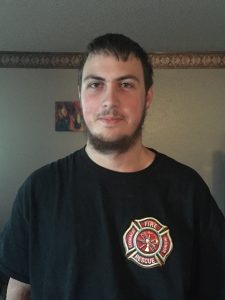
 It’s inevitable…the end of summer, turns into the first day of school. All the kids are torn between being bored from too much free time, and the dread of getting back into the grind of studying and homework. This year finds my family with just one public school student left. Our grandson, Josh Petersen is a senior in high school this year, so this is our last year with the public school system…until the great grandbabies start coming anyway. I am finding that hard to believe.
It’s inevitable…the end of summer, turns into the first day of school. All the kids are torn between being bored from too much free time, and the dread of getting back into the grind of studying and homework. This year finds my family with just one public school student left. Our grandson, Josh Petersen is a senior in high school this year, so this is our last year with the public school system…until the great grandbabies start coming anyway. I am finding that hard to believe.
Of course, once the kids get going, most of them enjoy school. Believe it or not, humans tend to want to be productive and for kids that does mean school. By the end of the year, they are ready for summer break, but by summer’s end, they are ready to get back into the swing of things again. They miss the organized sports, friends they don’t see except at 

 school, getting out of the house or daycare, and in reality, most of them actually enjoy learning. I don’t think any of us really want to go through life with no mental stimulation, and that is exactly what school does for the kids, whether they particularly like it or not.
school, getting out of the house or daycare, and in reality, most of them actually enjoy learning. I don’t think any of us really want to go through life with no mental stimulation, and that is exactly what school does for the kids, whether they particularly like it or not.
Then, of course, most kids usually get a few new articles of clothing to start out the new school year. For some, it is a matter of necessity, because of course, they have grown so much since last year, and for others, it is a necessity, because after all, you have to have at least one new outfit to start the year…right? And those new 
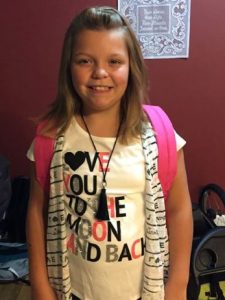 clothes and school supplies tend to take the sting of summer’s end out of the picture, a little bit anyway. I always thought it was fun to have new school supplies, even if the newness wore off pretty quickly.
clothes and school supplies tend to take the sting of summer’s end out of the picture, a little bit anyway. I always thought it was fun to have new school supplies, even if the newness wore off pretty quickly.
And so, as the kids come home after school, they are filled with stories of their day to pass on to their parents, and even a little bit of excitement just to be back…until they start to think about the homework they have to get done before school tomorrow. And then, there is the lack of outdoor playtime, because they have to get ready for the next day. That might be a bit of a let down, but that is what getting back into the swing of things is all about.
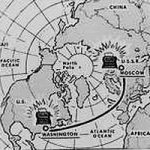 The United States and Russia have long been frenemies, truth be told, but in October of 1962, no one would have called them that. The Cuban Missile Crisis brought the two super powers to the brink of a nuclear conflict. As we all know, that would have been devastating for the inhabitants of the earth, and in the end, both countries agreed that we could not let things escalate to that level again. In June of 1963, American and Russian representatives agreed to establish a “hot line” between Moscow and Washington DC. The idea was to speed communication between the two governments to prevent an accidental war.
The United States and Russia have long been frenemies, truth be told, but in October of 1962, no one would have called them that. The Cuban Missile Crisis brought the two super powers to the brink of a nuclear conflict. As we all know, that would have been devastating for the inhabitants of the earth, and in the end, both countries agreed that we could not let things escalate to that level again. In June of 1963, American and Russian representatives agreed to establish a “hot line” between Moscow and Washington DC. The idea was to speed communication between the two governments to prevent an accidental war.
By August of 1963, the system was ready to be tested. American teletype machines were installed in the Kremlin and at the Pentagon. Many people have thought that the machine at the Pentagon was actually in the White House, but that is incorrect. The two nations exchanged 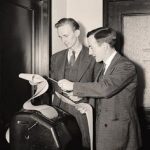 encoding devises so that they could decipher the messages. This would allow the two nations to message each other in a matter of minutes. That would be somewhat slow in today’s high tech world of cell phones and texting, but in those days, it was state of the art. Once received, the message would have to be deciphered, which did slow things down a bit, but again, at that time, it was state of the art. The two teletype machines were connected by a 10,000 mile long cable with “scramblers” along the way to ensure that the messages could not be intercepted by unauthorized personnel.
encoding devises so that they could decipher the messages. This would allow the two nations to message each other in a matter of minutes. That would be somewhat slow in today’s high tech world of cell phones and texting, but in those days, it was state of the art. Once received, the message would have to be deciphered, which did slow things down a bit, but again, at that time, it was state of the art. The two teletype machines were connected by a 10,000 mile long cable with “scramblers” along the way to ensure that the messages could not be intercepted by unauthorized personnel.
On August 30, the United States sent its first message to the Soviet Union over the hot line: “The quick brown fox jumped over the lazy dog’s back 1234567890.” The message was chosen because it used every letter and number key on the teletype machine in order to see that each was in working order. Moscow returned a message in Russian indicating that every key had worked properly. In the end, the hot line was never needed 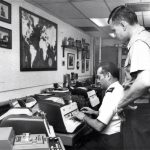 to prevent war, but instead has become a novelty item, used as a prop in movies about nuclear disaster. Fail Safe and Dr Strangelove were two movies that utilized the machines. The reality was that the two superpowers had come so close to mutual destruction back in 1962, that neither had much stomach for the proposed threat. They understood that communication was key in stopping a nuclear war. Of course, that has not stopped other nations from threatening to use nuclear weapons against other nations of the world. The Cold War ended a long time ago, but the “hot line” is still in operation between the two superpowers, and has since been supplemented by a direct secure telephone connection in 1999.
to prevent war, but instead has become a novelty item, used as a prop in movies about nuclear disaster. Fail Safe and Dr Strangelove were two movies that utilized the machines. The reality was that the two superpowers had come so close to mutual destruction back in 1962, that neither had much stomach for the proposed threat. They understood that communication was key in stopping a nuclear war. Of course, that has not stopped other nations from threatening to use nuclear weapons against other nations of the world. The Cold War ended a long time ago, but the “hot line” is still in operation between the two superpowers, and has since been supplemented by a direct secure telephone connection in 1999.

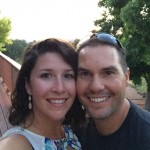 My niece, Lindsay Moore, is a social butterfly. She never had any trouble making new friends, and everyone who knows her, loves her. It’s a personality trait that Lindsay has. She can talk to anyone…and feel no shyness, and her friendship ability is coupled with her genuine caring nature. I remember when she was a teenager, and I would see her at church, before the service, talking to some of the other members of the congregation. It didn’t matter how old they were, or how young, Lindsay could talk to any of them. I always found the way she was when talking to some of the older members of the congregation to be the sweetest thing to watch. I remember when she was talking to a woman named Fern one time. I’m not sure how old Fern was at the time, but at least mid-seventies I would think. Lindsay went up and hugged her and then sat down to visit with her for a minute. Fern was obviously pleased that this teenager cared enough to talk to her, but it was also obvious that it wasn’t their first conversation. They were talking like friends, because they were friends. I know that Lindsay was just being Lindsay, but I can tell you that her actions affected more than one person in church that day. Fern, of course was very blessed by the sweet, loving girl who was sharing a moment with her, but there were others too. I noticed several other members of the congregation looking on with a sense of…well, pride, almost as if they had something to do with how Lindsay had turned out. They didn’t, of course, but she was a member of the church, and that gave them a sense of family, and therefore pride at how kind she was to Fern. For me…well, it was a picture that has been stored in my memory files since that day. Her way of making people feel important is something I’ll never forget about Lindsay.
My niece, Lindsay Moore, is a social butterfly. She never had any trouble making new friends, and everyone who knows her, loves her. It’s a personality trait that Lindsay has. She can talk to anyone…and feel no shyness, and her friendship ability is coupled with her genuine caring nature. I remember when she was a teenager, and I would see her at church, before the service, talking to some of the other members of the congregation. It didn’t matter how old they were, or how young, Lindsay could talk to any of them. I always found the way she was when talking to some of the older members of the congregation to be the sweetest thing to watch. I remember when she was talking to a woman named Fern one time. I’m not sure how old Fern was at the time, but at least mid-seventies I would think. Lindsay went up and hugged her and then sat down to visit with her for a minute. Fern was obviously pleased that this teenager cared enough to talk to her, but it was also obvious that it wasn’t their first conversation. They were talking like friends, because they were friends. I know that Lindsay was just being Lindsay, but I can tell you that her actions affected more than one person in church that day. Fern, of course was very blessed by the sweet, loving girl who was sharing a moment with her, but there were others too. I noticed several other members of the congregation looking on with a sense of…well, pride, almost as if they had something to do with how Lindsay had turned out. They didn’t, of course, but she was a member of the church, and that gave them a sense of family, and therefore pride at how kind she was to Fern. For me…well, it was a picture that has been stored in my memory files since that day. Her way of making people feel important is something I’ll never forget about Lindsay.
Lindsay has had the opportunity to live a number of places in her life. She was born in Casper, Wyoming, but has lived in South Dakota, Florida, and North Carolina. Her husband’s work as a college special teams coach also gives them the opportunity to travel to recruit players, so she has been a lot of places. I’ve often wondered if the moves were difficult. Being somewhat shy, myself, it is hard for me to imagine making new 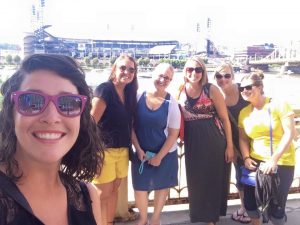
 friends every time another move was necessary, but Lindsay really has no trouble. Everywhere she has lived, she makes new friends quickly. Then when she has to move, she remains friends with the people she has met…for life. I think it all goes back to that ability to share a moment with people. Then moments turn into a friendship that forms because Lindsay genuinely cares about people, and people want to be friends with people like that. Today is Lindsay’s birthday. Happy birthday Lindsay!! Have a great day!! We love you!!
friends every time another move was necessary, but Lindsay really has no trouble. Everywhere she has lived, she makes new friends quickly. Then when she has to move, she remains friends with the people she has met…for life. I think it all goes back to that ability to share a moment with people. Then moments turn into a friendship that forms because Lindsay genuinely cares about people, and people want to be friends with people like that. Today is Lindsay’s birthday. Happy birthday Lindsay!! Have a great day!! We love you!!
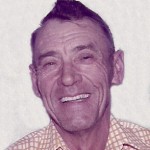 My father-in-law, Walt Schulenberg would have turned 87 today. In the three years and almost four months since he went to Heaven, I can say that I have missed him very much, and yet it’s been like he never really left. Alzheimer’s Disease has taken the memory of her husband’s passing away from my mother-in-law, along with the passing of her parents and her daughter. It isn’t a bad thing for her, because she doesn’t have to experience the grief the rest of us have to go through. Nevertheless, because of her condition, I…we, the family have had to keep up the charade that Dad, Marlyce, and the Knox grandparents are still alive.
My father-in-law, Walt Schulenberg would have turned 87 today. In the three years and almost four months since he went to Heaven, I can say that I have missed him very much, and yet it’s been like he never really left. Alzheimer’s Disease has taken the memory of her husband’s passing away from my mother-in-law, along with the passing of her parents and her daughter. It isn’t a bad thing for her, because she doesn’t have to experience the grief the rest of us have to go through. Nevertheless, because of her condition, I…we, the family have had to keep up the charade that Dad, Marlyce, and the Knox grandparents are still alive.
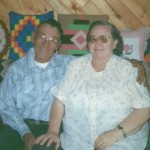
There is a song that Tim McGraw sings about a girlfriend that broke up with her boyfriend because he wanted to move away and she didn’t. He never quite got over her, and in his imagination, he saw her in all the places he traveled. For the man in the song, I’m sure the visions were somewhat torturous, but for my mother-in-law, they are a blessing. She sees Dad in some of the men at the nursing home, in her sons and even grandsons, and she has it in her mind that he is simply in the garage, at the neighbors, or at Walmart. When she asks about him, I always tell her that he is at Walmart, and he will be back later. That satisfies her, because she knows that he would never leave her. And we know it too.
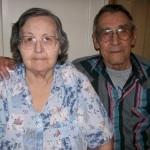 I have to wonder if Dad ever thought about all the places he would be see after he left for Heaven. We tend to think that when we pass away, we will only live on in the hearts of our loved ones, and that’s true, but the mind is a funny thing. Our imaginations can place our loved ones in places they really aren’t…whether our mind is sharp or not. There are many times I can see my mom and dad, my father-in-law, sister-in-law, and grandparents in many memories that I have filed away in my memory files, but I think that most of the time, my memories aren’t nearly a vivid as my mother-in-law’s, and that’s ok, because it allows my father-in-law to keep his promise, never to leave her, alive in my mother-in-law’s life. Happy birthday in Heaven Dad. We love and miss you very much.
I have to wonder if Dad ever thought about all the places he would be see after he left for Heaven. We tend to think that when we pass away, we will only live on in the hearts of our loved ones, and that’s true, but the mind is a funny thing. Our imaginations can place our loved ones in places they really aren’t…whether our mind is sharp or not. There are many times I can see my mom and dad, my father-in-law, sister-in-law, and grandparents in many memories that I have filed away in my memory files, but I think that most of the time, my memories aren’t nearly a vivid as my mother-in-law’s, and that’s ok, because it allows my father-in-law to keep his promise, never to leave her, alive in my mother-in-law’s life. Happy birthday in Heaven Dad. We love and miss you very much.

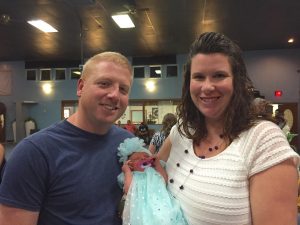 Four years ago, my niece Jessi Hadlock married Jason Sawdon, and they began a blessed life together. Theirs was the last wedding my mom, Jessi’s grandma, Collene Spencer was able to attend. Mom always felt very blessed by Jessi, and then by Jason too. Jessi and Jason were very much in love, but they knew that it was time for their love to grow, with the addition of a child. It had been a long wait for all of us who knew about the pregnancy, because unlike most couples these days, Jessi and Jason decided not to find out the gender of the baby. They wanted this whole experience to be filled with excitement and mystery. Lots of people asked them over and over again if they were going to find out what the baby was, but they stood their ground. The chosen names for girl or boy were kept secret too.
Four years ago, my niece Jessi Hadlock married Jason Sawdon, and they began a blessed life together. Theirs was the last wedding my mom, Jessi’s grandma, Collene Spencer was able to attend. Mom always felt very blessed by Jessi, and then by Jason too. Jessi and Jason were very much in love, but they knew that it was time for their love to grow, with the addition of a child. It had been a long wait for all of us who knew about the pregnancy, because unlike most couples these days, Jessi and Jason decided not to find out the gender of the baby. They wanted this whole experience to be filled with excitement and mystery. Lots of people asked them over and over again if they were going to find out what the baby was, but they stood their ground. The chosen names for girl or boy were kept secret too.
Finally, six days after her due date, Jessi gave birth to a beautiful baby girl named Adelaide Ione. She was born on August 25, 2016 at 3:18pm. She weighed 7 pounds 14 ounces and she was 20 inches long. She is a mix of her parents, and some see Jessi, while others see Jason, but there were tears all around when Jason introduced little Adelaide Ione to my sister Allyn Hadlock and her husband, Chris Hadlock, because her name was extra special. Adelaide came from Jessi’s grandpa Hadlock’s mom…Dorothy Adelaide Hadlock, and Ione came from Jessi’s grandmother…my mom, Collene Ione Spencer. I know that both grandmothers would have been very pleased. It was such a sweet name choice, and one that was felt deeply by the whole family. I know that my mom would have loved having a little namesake, and I’m sure Jessi’s dad’s grandma would have too. There are few things that are more of an honor to a person than that.
Little Adelaide Ione came home with her parents, and got to meet another member of the family, who was very curious about this new addition. Jessi and Jason have a sweet Boxer dog named Daisy, and Daisy thinks that little Adelaide Ione is pretty much the coolest thing ever. Daisy suddenly feels like she has a job to do…watch 
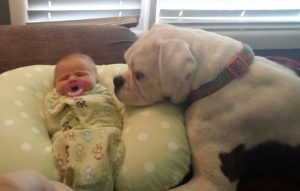 over this precious little person who has joined their family. Dogs are sometimes so motherly, and it is such a sweet gesture. Of course, little does Daisy know that before long that little person will be able to run and play with her. Daisy will soon have a playmate, and that will really be awesome. Adelaide Ione came home to find herself a part of a family who is totally in love with her, and that is a great way to start life. Congratulations to Jessi, Jason, Adelaide Ione, and of course, Daisy too. We are so happy for all of you.
over this precious little person who has joined their family. Dogs are sometimes so motherly, and it is such a sweet gesture. Of course, little does Daisy know that before long that little person will be able to run and play with her. Daisy will soon have a playmate, and that will really be awesome. Adelaide Ione came home to find herself a part of a family who is totally in love with her, and that is a great way to start life. Congratulations to Jessi, Jason, Adelaide Ione, and of course, Daisy too. We are so happy for all of you.
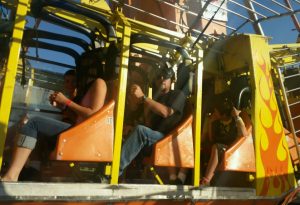
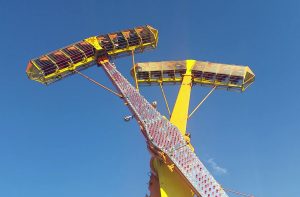 My nephew, Josh Griffith has totally embraced the role of fatherhood. Josh and my niece Susan want to make sure that their girls have memorable childhoods. As we all know, kids grow up so fast, and childhood is over before we know it. Josh and Susan try to do something special every few weekends, when the chores around the place can be put on hold. The girls, Jala and Kaytlyn love going to the Park County Fair, and this year Josh volunteered to take them on rides they hadn’t been allowed to go on before. Jala chose the Sky Master and Kaytlyn chose the Zipper. There was a bit of a scare on the Zipper, when Kaytlyn slipped out of the seat the first time it went upside down, but here daddy caught her and held on tight for the rest of the ride. Both girls were kind of scared to go on the rides, but once they realized that they weren’t going to die, they decided that they had a great time. The girls like the scary rides…what is it with scary rides…so Josh took them on some when the family went to Elitch’s, while they were in Denver a couple of years ago. Susan and I tend to feel the same way about rides, because when the family talked her into going on the roller coaster at Elitch’s, it ended the day, because Susan was
My nephew, Josh Griffith has totally embraced the role of fatherhood. Josh and my niece Susan want to make sure that their girls have memorable childhoods. As we all know, kids grow up so fast, and childhood is over before we know it. Josh and Susan try to do something special every few weekends, when the chores around the place can be put on hold. The girls, Jala and Kaytlyn love going to the Park County Fair, and this year Josh volunteered to take them on rides they hadn’t been allowed to go on before. Jala chose the Sky Master and Kaytlyn chose the Zipper. There was a bit of a scare on the Zipper, when Kaytlyn slipped out of the seat the first time it went upside down, but here daddy caught her and held on tight for the rest of the ride. Both girls were kind of scared to go on the rides, but once they realized that they weren’t going to die, they decided that they had a great time. The girls like the scary rides…what is it with scary rides…so Josh took them on some when the family went to Elitch’s, while they were in Denver a couple of years ago. Susan and I tend to feel the same way about rides, because when the family talked her into going on the roller coaster at Elitch’s, it ended the day, because Susan was 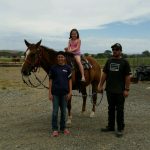 sick. I would have been too, Susan. Thankfully, they had been there all day, so it was time to go anyway, but getting sick on rides is a problem Josh doesn’t have. For the girls, that’s good, because he can take them on the rides Susan can’t stomach.
sick. I would have been too, Susan. Thankfully, they had been there all day, so it was time to go anyway, but getting sick on rides is a problem Josh doesn’t have. For the girls, that’s good, because he can take them on the rides Susan can’t stomach.
While Josh was in good shape for the fair, the summer started out with…not a bang, but rather a crash. Josh was riding his dirt bike with friends at the beginning of May, and broke his ankle pretty bad when he took a spill. He didn’t think it was broken at first, but by the time he got home…it was obvious. In the end, he had to have surgery to repair the badly broken ankle. It would take a plate and eleven screws to put it back together. Thankfully he only missed a few days of work. Then his dad let him borrow a wheel chair he had and Josh went back to work. Josh used the wheel chair for a couple of weeks, and then his boss hurt his ankle. He got a wheel chair too, and they were both working in wheel chairs. Personally, I think his boss decided that it looked like fun. And even if that’s not the case, I have to think the whole thing would have been a little bit funny to see. Susan wondered the same thing…what did the customers coming into the shop think, seeing two guys in wheel chairs working on cars? They didn’t get any pictures, and I think that is a real bummer. Nevertheless, I’m glad Josh is doing better now.
Susan told me that Josh is one of those people who is funny, without even trying. I think that is a wonderful 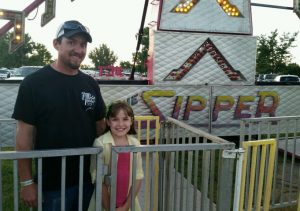
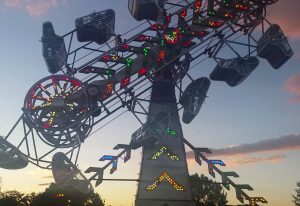 trait to have. People love to listen to someone who can find the funny in any situation. Life is never boring. For those of us who are a little more shy, that is a trait that we would love to have, but while we know jokes and such, they just don’t come to mind when we need them. Josh doesn’t even have to try to find the funny. It all comes quite naturally to him. Today is Josh’s birthday. Happy birthday Josh!! Have a great day!! We love you!!
trait to have. People love to listen to someone who can find the funny in any situation. Life is never boring. For those of us who are a little more shy, that is a trait that we would love to have, but while we know jokes and such, they just don’t come to mind when we need them. Josh doesn’t even have to try to find the funny. It all comes quite naturally to him. Today is Josh’s birthday. Happy birthday Josh!! Have a great day!! We love you!!
![13532869_10206657885913369_359834100990588437_n[1]](https://carynschulenberg.com/wp-content/uploads/2016/08/13532869_10206657885913369_359834100990588437_n1-150x150.jpg)
![13606930_10206678903318791_5303133049315182074_n[1]](https://carynschulenberg.com/wp-content/uploads/2016/08/13606930_10206678903318791_5303133049315182074_n1-150x150.jpg) My grand niece, Aurora Hadlock is turning five today. For her, these are exciting days. Aurora, or Rory, as she was nicknamed, is so excited about going to Kindergarten this year. I remember when she started pre-school. If it was possible, I think Rory was the most excited kid ever to start pre-school. That love of learning has never left her either. Rory looks forward to each day, because to her they are brand new…there are new things to learn…new friends to make…and each new day is a new adventure.
My grand niece, Aurora Hadlock is turning five today. For her, these are exciting days. Aurora, or Rory, as she was nicknamed, is so excited about going to Kindergarten this year. I remember when she started pre-school. If it was possible, I think Rory was the most excited kid ever to start pre-school. That love of learning has never left her either. Rory looks forward to each day, because to her they are brand new…there are new things to learn…new friends to make…and each new day is a new adventure.
Rory, who’s mom, Chelsea Hadlock is very imaginative, has ![10676195_10202953479705529_3463465173877702689_n[1]](https://carynschulenberg.com/wp-content/uploads/2016/08/10676195_10202953479705529_3463465173877702689_n1-225x300.jpg) decided to have an Alice in Wonderland birthday this year. Her mom will make it such a fun day. Chelsea is very creative, and has the ability to make her kids’ dreams come true, so their birthdays are always a wonderful event. Rory is growing up so fast. Her mom says she is growing like a wildflower, and I think that is the truth. Rory is very much a girly girl, and she would wear a dress every day if she could. She loves dressing up, and has a lot of fun wearing dresses that are the same as, or very close to her mom’s dresses. Rory wants to look as beautiful as her mommy, and what a wonderful way to show her love for her mom too. Rory is very proud of her mom, and wants to be just like her. Rory has several favorites things, she loves tomatoes…shocking for a little girl, and sweet tea…again rare for a child, and of course, she loves to ride her bike…but then what kid doesn’t.
decided to have an Alice in Wonderland birthday this year. Her mom will make it such a fun day. Chelsea is very creative, and has the ability to make her kids’ dreams come true, so their birthdays are always a wonderful event. Rory is growing up so fast. Her mom says she is growing like a wildflower, and I think that is the truth. Rory is very much a girly girl, and she would wear a dress every day if she could. She loves dressing up, and has a lot of fun wearing dresses that are the same as, or very close to her mom’s dresses. Rory wants to look as beautiful as her mommy, and what a wonderful way to show her love for her mom too. Rory is very proud of her mom, and wants to be just like her. Rory has several favorites things, she loves tomatoes…shocking for a little girl, and sweet tea…again rare for a child, and of course, she loves to ride her bike…but then what kid doesn’t.
One thing that I didn’t know about Rory is that she wants to be a doctor. This has been a dream of hers for ![11986937_10207241894556588_5179927847889566122_n[1]](https://carynschulenberg.com/wp-content/uploads/2016/08/11986937_10207241894556588_5179927847889566122_n1-150x150.jpg)
![12002112_10204879110805103_8206092303737254724_n[1]](https://carynschulenberg.com/wp-content/uploads/2016/08/12002112_10204879110805103_8206092303737254724_n1-150x150.jpg) some time. I find it completely amazing that this little five year old girl wants to be a doctor. Girls her age are thinking about being a princess, a mommy, or a ballerina…but never a doctor. I have to wonder what has made her choose this noble profession…and at this young age. I find that little fact about Rory to be especially awesome, because as a caregiver, I know how important doctors are. And just think, with her love of dresses, Rory can be the Princess Doctor. Today is Rory’s 5th birthday. Happy birthday Rory!! Have a great day!! We love you!!
some time. I find it completely amazing that this little five year old girl wants to be a doctor. Girls her age are thinking about being a princess, a mommy, or a ballerina…but never a doctor. I have to wonder what has made her choose this noble profession…and at this young age. I find that little fact about Rory to be especially awesome, because as a caregiver, I know how important doctors are. And just think, with her love of dresses, Rory can be the Princess Doctor. Today is Rory’s 5th birthday. Happy birthday Rory!! Have a great day!! We love you!!
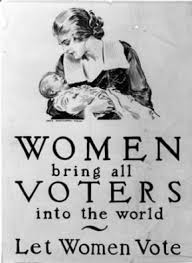 Anytime a group wants to change something in their nation, there is controversy. It really doesn’t matter what the change is, or whether it is good or bad for the country, there will always be people who are against it. The Women’s Suffrage movement, was no different. For more that seventy years, women had been fighting for the right to vote. From the founding of the United States they had not been allowed to vote, and I think originally it was simply because women were viewed as fragile and really to be protected. It didn’t really occur to the men that women could understand politics, wars, and government matters. They were to delicate. That opinion was largely accepted by the women too, until about 1849…73 years after our nation gained its independence from Great Britain. Then some of the women started thinking that they were are smart as the men, and should be allowed to vote too. They were right, of course, but their victory would not come without a long, hard battle. For many years the women who were fighting to vote were look at as
Anytime a group wants to change something in their nation, there is controversy. It really doesn’t matter what the change is, or whether it is good or bad for the country, there will always be people who are against it. The Women’s Suffrage movement, was no different. For more that seventy years, women had been fighting for the right to vote. From the founding of the United States they had not been allowed to vote, and I think originally it was simply because women were viewed as fragile and really to be protected. It didn’t really occur to the men that women could understand politics, wars, and government matters. They were to delicate. That opinion was largely accepted by the women too, until about 1849…73 years after our nation gained its independence from Great Britain. Then some of the women started thinking that they were are smart as the men, and should be allowed to vote too. They were right, of course, but their victory would not come without a long, hard battle. For many years the women who were fighting to vote were look at as 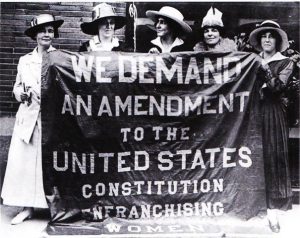 somehow being bold, and well simply not very refined. Proper women were encouraged to avoid them. The men heckled them. Everyone thought of these women as being somewhat trashy.
somehow being bold, and well simply not very refined. Proper women were encouraged to avoid them. The men heckled them. Everyone thought of these women as being somewhat trashy.
I can’t say for sure, just what it was that finally tipped the scales in favor of the women’s right to vote, but quite possibly it had something to do with the “squeaky wheel getting the oil” in the end. Nevertheless, like anything worth fighting for, you continue to fight until you win, or until there is no hope of winning. For the women of the United States, the battle would be won. Changes are sometimes tough to swallow…especially when we think they are 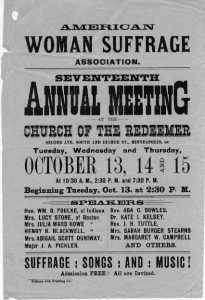 morally wrong. It doesn’t matter what day and age we live in, or what the issue is, someone, somewhere is going to be against the new idea. There will be battles that should be won and those that probably shouldn’t. Nevertheless, like it or not, once a new idea is made law, it usually stays law, unless the law is changed later on. Thankfully, for women everywhere, the right to vote was not repealed, and it will always be our right.
morally wrong. It doesn’t matter what day and age we live in, or what the issue is, someone, somewhere is going to be against the new idea. There will be battles that should be won and those that probably shouldn’t. Nevertheless, like it or not, once a new idea is made law, it usually stays law, unless the law is changed later on. Thankfully, for women everywhere, the right to vote was not repealed, and it will always be our right.
On this day August 26, 1920, the 19th Amendment, guaranteeing women the right to vote, is adopted into the United States Constitution by proclamation of Secretary of State Bainbridge Colby. Women could vote now and forever. People born since 1920, which is most of us, have no concept of the enormity of that amendment. It changed the face of politics, government, and campaigning forever. Not only could women vote, but they could run for office too. And that idea has been up for debate ever since.

